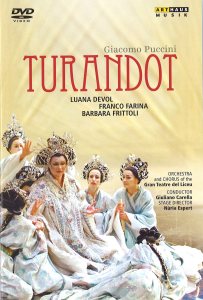 |
 |
|


alternatively
CD: MDT
AmazonUK
AmazonUS
|
Giacomo PUCCINI (1858-1924)
Turandot - an opera in three acts (1924-26)
 Turandot: Luana De Vol; Liù: Barbara Frittoli; Calaf: Franco
Farina; Timur: Stefano Palatchi; Ping: Lluis Sintes; Pang: Francisc
Vas; Pong: David Alegret; The Mandarin: Philip Cutlip
Turandot: Luana De Vol; Liù: Barbara Frittoli; Calaf: Franco
Farina; Timur: Stefano Palatchi; Ping: Lluis Sintes; Pang: Francisc
Vas; Pong: David Alegret; The Mandarin: Philip Cutlip
Orquestra Simfònica i Cor del Gran Teatre del Liceu/Giuliano
Carella
rec. Gran Teatre del Liceu, Barcelona, 2004
Picture format: NTSC 16:9 (widescreen)
Sound format: LPCM Stereo / Dolby Digital 5.1 / DTS 5.1
Region code: 0 (All Regions)
Subtitles: English, French, German, Italian, Spanish Catalan
Bonus: “Luana DeVol: Following the Dream”
 ARTHAUS 107 305
ARTHAUS 107 305  [132:00 (opera); 19:00 (bonus)]
[132:00 (opera); 19:00 (bonus)]
|
|
|
A recent release of a performance from several years ago, this
DVD of Turandot makes available an estimable staging
of the opera. When the Gran Teatro del Liceu reopened in 1999
after its tragic fire, the house celebrated the occasion with
a new production of Puccini’s Turandot, which has
since been revived. Among the notable revivals is one in 2005,
which included Barbara Frittoli as Liù, along with other
internationally known soloists. At the risk of overstatement,
this recording deserves particular attention because of Frittoli’s
deft performance of this role. As familiar as the opera Turandot
has become for modern audiences, the characterization of Liù
sometimes fails to get the attention often accorded the sopranos
who take on the virtuosic title role. Here, though, Frittoli
brings Liù with elegance, grace, and authority. She is
essentially a dramatic and musical force, and at Liù’s
death, this production pauses appropriately. This moment merits
attention for the way in which it is shown to affect Turandot,
here sung by American soprano Luana DeVol.
In the title role DeVol offers a solid reading. She succeeds
in the more demanding passages and also sustains her command
of the stage in the subtler ones. The orchestral balance never
seems to challenge DeVol in her solo passages, and so it is
possible to apprehend some of the nuances she gives her character,
especially in the penultimate scene between Turandot and Calaf.
On only a few occasions DeVol seems a little stressed, but she
never succumbs to some of the strident sounds Franco Farina
unfortunately delivered in this live performance. The DVD is
based on a television broadcast. This seems to be the result
of the demands from sometimes lingering tempos, and those who
know Farina’s voice realize the qualities he brings and
can admire the effort he gave in this otherwise fine performance.
His understated “Nessun dorma” is fitting, and drew
the appropriate response from the audience, with good continuity
in the following scene that leads to Liù’s confession
of love and her death.
Stefano Palatchi’s Timur is solid, as are the well-rehearsed
ensembles of Ping, Pang, and Pong, here sung by Lluis Sintes,
Francisco Vas, and David Alegret. Vocally appealing, the trio
is subjected to costumes that resemble evening gowns, which
gather at their upper chests to suggest uncharacteristic cleavage.
This androgynous element is at odds with the customary depiction
of these three characters, a detail that would be easy to ignore
if the roles were less prominent. Yet this weakness in the production
is the exception, rather than the rule in this generally effective
staging.
On the whole, though, this performance offers details made possible
through the medium of film. The intimate exchanges between Turandot
and Calaf have an authentic ring through the proximity of the
characters to each other on stage, and their ensemble simultaneously
reaches the audience well. Some moments of the duet before the
Finale suggest the second act of Wagner’s Tristan und
Isolde with the suggestion of a starry night behind the
characters, who are not competing with the sets in this staging
for the attention of the audience. The focus remains on the
music, with the close camera angles under-scoring the transformation
of Turandot as it occurs in the score.
At the same time it is difficult to imagine Turandot
without the crowd scenes that connote the pomp and splendor
of the ancient Chinese court. Here stage director Núria
Espert positioned the chorus and supernumeraries creatively.
The result is animated, rich, and full and the sound supports
the theatrical effects. The choral numbers are well staged and
sonically differentiated. As expected, the opening scene must
have a dark sound to convey the straits of the populace in light
of Turandot’s fatal contest, and the chorus reflects satisfactorily.
In a similar way, the exuberant chorus at the Finale has an
appropriately celebratory tone, which emerges not only from
the music Puccini set, but the tone shaped by chorus master
Oscar Boada and supported by conductor Giuliano Carella. At
the end the chorus has the final word, and in this case, it
is quite effective.
The bonus is a short film devoted to DeVol’s career. It
provides some background on the soprano’s career, along
with her approach to singing. It concludes the disc, which has
the usual features, like subtitles in multiple languages. The
sound engineering offers realistic balances between vocal and
instrumental sonorities, with the reverberation never obtrusive.
The visual dimension is good, with the lighting supporting the
whole. Those who have not yet seen this production may want
to pursue it in this release on DVD.
James L Zychowicz
|
|




 All Nimbus reviews
All Nimbus reviews








